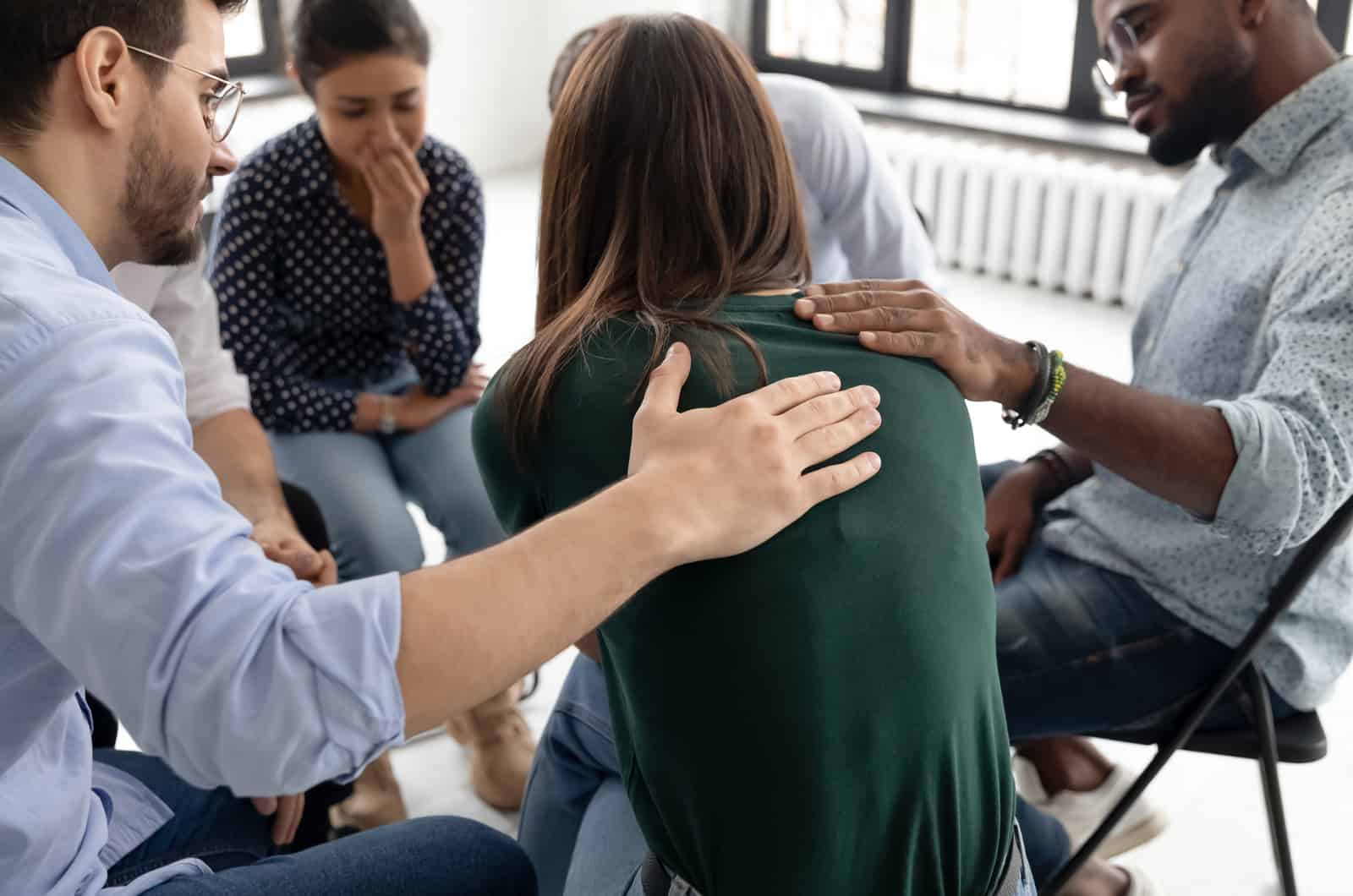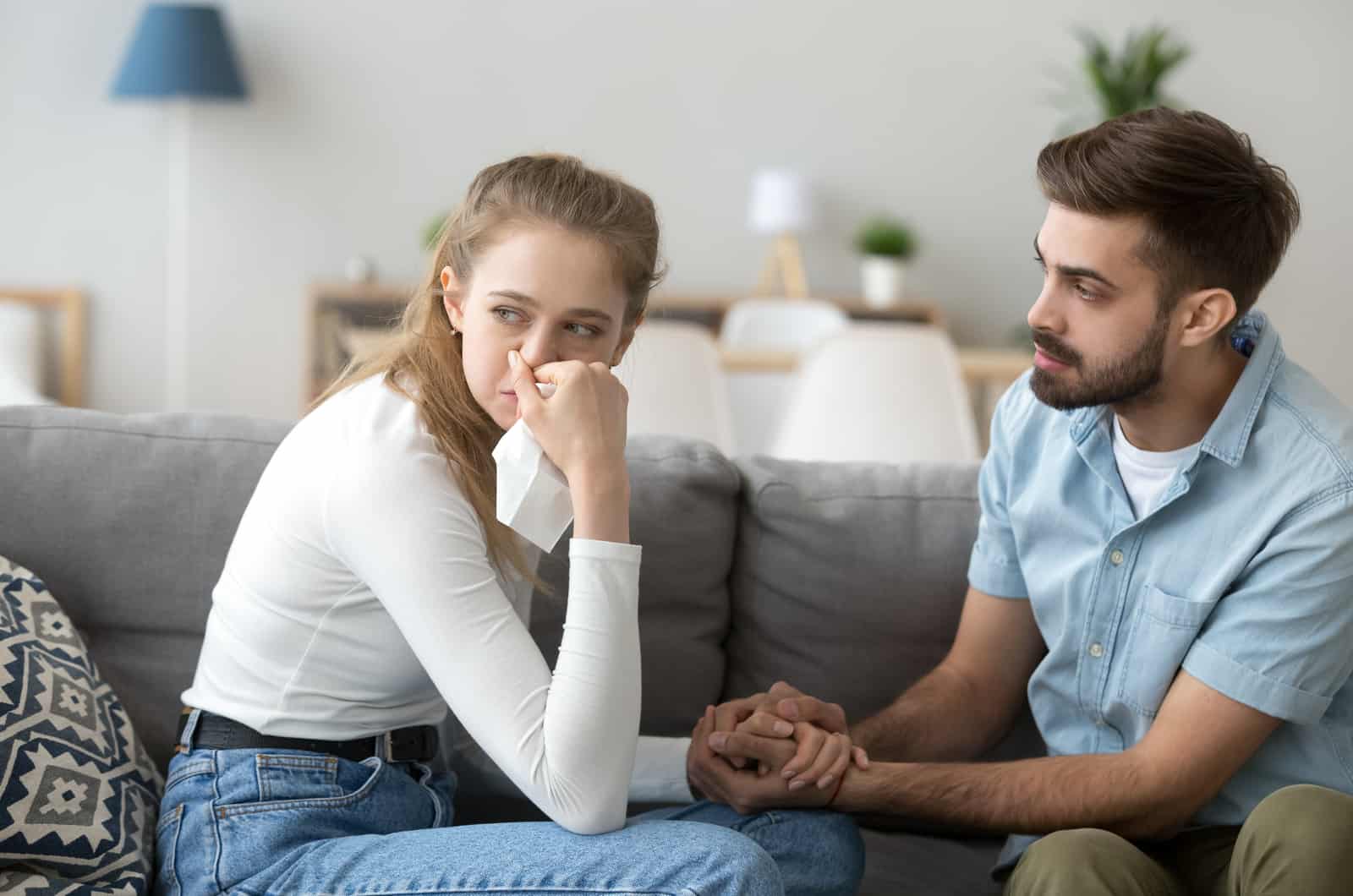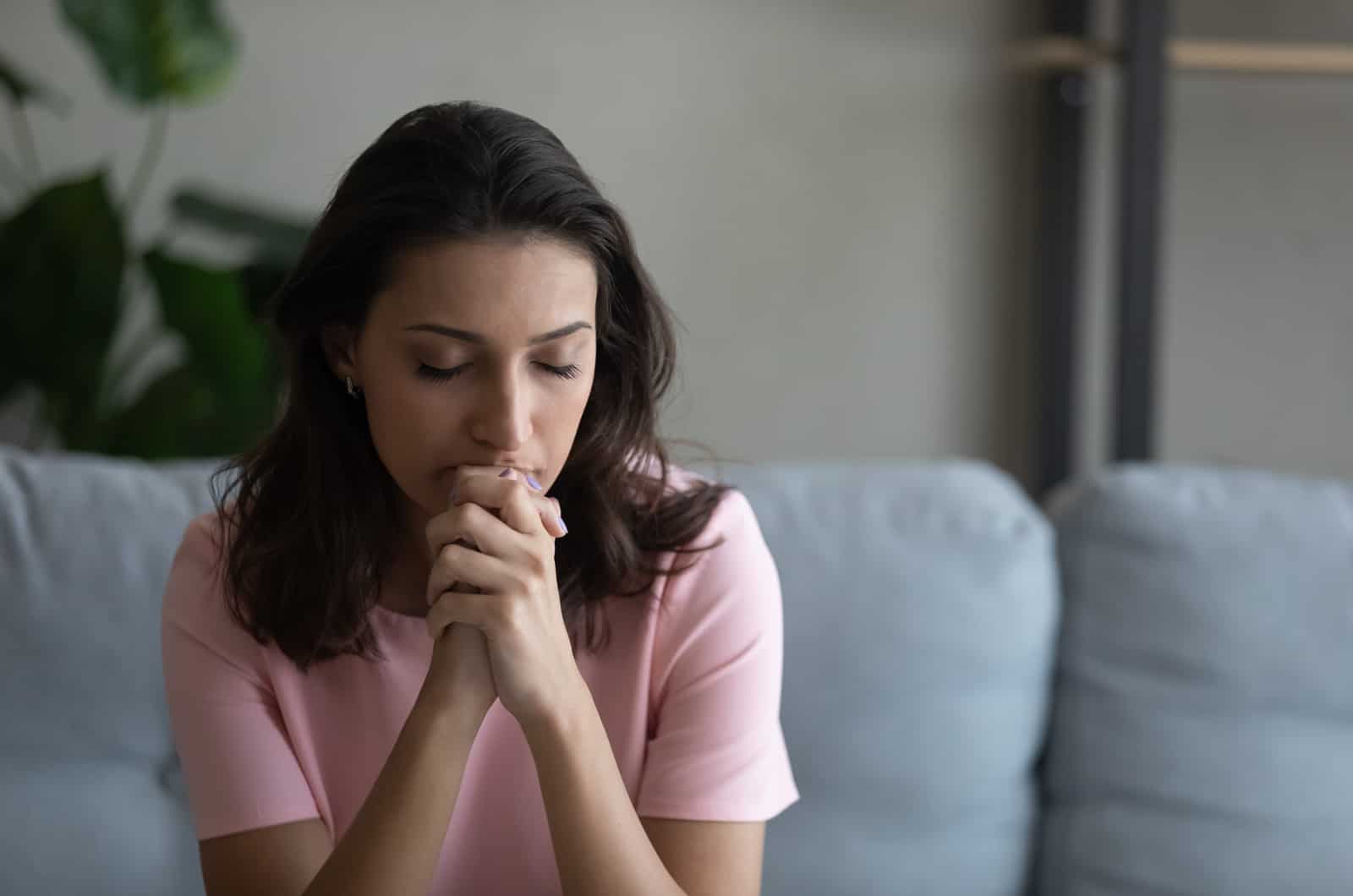All of us experience sadness and heartbreak. At times, it can become so difficult to live with that we simply shut it off. We refuse to feel it because, why would we? It just keeps us away from all the enjoyment we could have.
We think that those feelings are just a sign of weakness as well as a waste of our time. Shame and self-judgment are often involved because people constantly tell us not to be sad and that everything is going to be okay.
Have you gotten tired of refusing to feel pain?
Do you keep doing it because you think it makes you strong?
Well, I’m here to show you that being strong means something else entirely…
You will see that feeling grief is essential for your well-being and that being emotionally vulnerable comes with many advantages. If you want to know exactly what those are as well as what emotional vulnerability really is, read on to find out.
What Is Emotional Vulnerability?
Emotional vulnerability is one’s ability to embrace each emotion as it is. There’s no division in the degree of importance between negative and positive emotions. Both are equally accepted and dealt with in a healthy way.
When we hear the term ’emotional vulnerability,’ what comes to mind are negative feelings, specifically pain and anger. The primary purpose of this personality trait is to allow such emotions to exist.
In her famous book Daring Greatly: How the Courage to be Vulnerable Transforms the Way We Live, Love, Parent, and Lead, Dr. Brené Brown gives her own definition of vulnerability: ”uncertainty, risk, and emotional exposure.”
What does this mean?
It means that you fear rejection, but at the same time fear being known.
She further elaborates on the role of shame in her TED talk Listening to Shame. She talks about the different ways men and women see vulnerability.
The latter feel like they have to hide their pain because they ought to be independent and perfect, whereas the former want to be perceived as manly.
Shame can indeed prevent us from being vulnerable, both in front of others as well as ourselves. But that’s natural, and you can overcome it by embracing vulnerability more each day.
What’s important to know is that you don’t have to feel all your emotions all the time. That would be very unhealthy and would ultimately lead to self-destruction. So, if you’re someone who focuses on your pain 24/7, please keep that in mind.
As much as you have to acknowledge that you are in pain, you also have to continue living your life.
What Does Emotional Vulnerability Look Like?
Emotional vulnerability can manifest itself in different ways. It can be something as simple as a conversation or someone crying their heart out.
Every person does it differently. Perhaps you will provide a full in-depth analysis or say only a few words but nevertheless convey your meaning. What’s important is that each of these is a genuine expression of how you feel.
If you’re still uncertain about what emotional vulnerability looks like, here are a few examples:
•talking about family problems
•telling your best friend that you appreciate them
•apologizing for your wrong-doings
•not pretending to be happy when you’re sad
•allowing yourself to cry if you need to
•telling someone that they’ve hurt your feelings
•discussing your mental health issues
•revealing past traumatic experiences.
Is It Good Being Vulnerable?
Being emotionally vulnerable is often perceived as weakness, but this is far from the truth. Such people are actually stronger than those who repress their emotions precisely because they’re not afraid of them.
Emotional vulnerability is a trait that should always be celebrated and not frowned upon or rejected.
Still, while there are many benefits of emotional vulnerability, certain problems may arise.
Why do some people wish they were less emotionally vulnerable?
The answer is pretty simple – it’s due to the intensity of their feelings. For them, it’s too much, and they can hardly handle it.
Of course, it’s perfectly valid to feel this way. You can feel overwhelmed by your own inner world. However, I’m here to show you all the ways emotional vulnerability enriches your life and makes you braver than ever.
See also: The Best Partner For A Highly Sensitive Person: 15 Top Traits
12 Benefits Of Being Emotionally Vulnerable
Even if it gets hard at times, emotional vulnerability provides you with a great number of benefits that will change your life forever.
Its positive influence not only makes you more capable of overcoming any obstacle that comes your way, but it also greatly impacts your relationships.
How does this positive influence manifest itself?
In what way does emotional vulnerability change your relationships?
Well, this is how:
1. It helps you form genuine human connections.
Do you always refrain from sharing anything private?
How much do your friends know you?
I can say with certainty that the day I started being more emotionally vulnerable was the day I learned how to create true friendships and more intimate romantic relationships.
Think about it. How deeply can someone love you if all they know is surface details of your daily life that everyone else knows? But when you share something genuine and raw, you create a bond that is not easily broken.
Even if you stop talking, it never ceases to be there. All that you’ve ever shared connects you to each other forever. There’s a truth between you that silence cannot destroy.
2. You deal with pain more easily.
If you think that by refusing to acknowledge grief, it will magically disappear, you are gravely mistaken.
Suppressing your emotions never helps but rather hurts you all the more. Moreover, it’s a sign of low self-esteem. When you realize this, you’re going to become stronger and more resilient.
The more you accept and validate your pain, the easier it will be to deal with it. If you don’t, it simply magnifies and makes you weak without you even realizing it.
Trust me, letting your emotions out is never a weakness, no matter what they tell you. The only way you can overcome your problems is by being honest with yourself.
After all, isn’t suppression really fear? You’re afraid of what will happen if you face yourself. But I’m afraid the real question is what will happen if you don’t.
3. You’re more self-conscious.
When you allow yourself to feel all your emotions, you start gaining more self-knowledge. If you refuse to feel pain, you also never stop to think about why it’s there, right?
Well, this is why when you finally let it out, you’re also able to determine its root cause.
For instance, quite often, we turn grief into anger. We don’t want to appear weak, so it’s easier to rant about how much something annoys you.
When you realize what your anger really means, you can think about why it’s there in the first place. There is great power in self-awareness. Don’t ever forget that!
4. You learn to read people.
As Aristotle once said: ”Knowing yourself is the beginning of all wisdom.”
Emotional vulnerability doesn’t only help you with that, but with knowing others too. You’re more careful about letting new people inside your circle because you can see right through them.
Your wisdom allows you to differentiate between those with good intentions and those who will bring you nothing but harm.
Furthermore, you take things less personally. You see when others lack confidence and are driven by their insecurities and are aware that their outbursts rarely have anything to do with you.
5. You’re ready to take accountability.
It’s in the nature of human beings to shift the blame onto someone else when they’re not ready to deal with it. You’re not fully aware of the consequences of your actions because you refuse to sit down and think about them.
You’re ready to gaslight people into thinking it’s their fault, or you dismiss the situation altogether.
However, when you’re more emotionally vulnerable, you have no problem admitting your own misdeeds. You’re not afraid to go on a guilt trip, but you rather take accountability for them.
When you internally deal with a situation, you also have the power to change it.
6. You’re a better friend.
There are many people who tell you to deal with sadness by looking at the bright side. That’s a telltale sign that they’re not emotionally vulnerable because when you are, you’re more careful about the advice you give.
You’ve been there, and you know how liberating it is to express all that you feel. So, when someone comes to you for comfort, you encourage them to do the same.
Feeling your own emotions makes you more capable of empathizing with others. This is why you’re probably the friend that everyone seeks when they’re sad.
7. You don’t have to suffer alone anymore.
It’s not uncommon for people to think that their sadness is only their burden to bear. They either don’t want to trouble others, or they’re afraid to open up. Either way, having to go through it alone leaves them exhausted.
However, emotionally vulnerable people never hesitate to share what they feel. When you realize that your emotions are valid, opening up isn’t a problem anymore.
You freely talk about things that bother you so you don’t have to do it alone.
P.S. Make sure to check if your friends have the mental space to listen to you. You don’t want to unload all your problems on them if they have their own to deal with.
8. You realize the value of all emotions.
It’s not unusual if you think that negative emotions are bad. After all, ever since we were children, society has told us to keep smiling because there’s no use in being sad.
Emotional vulnerability makes you realize how toxic this kind of thinking is. It makes you value both negative and positive emotions equally.
Do you hate feeling angry? Your anger is a form of self-protection. It exists because you love yourself enough to confront someone that’s hurting you in any way.
Do you often feel anxious? That’s just you caring about yourself enough to not want to end up in a dangerous situation.
I’m not trying to say that you should go around and yell at people and call it self-love. Just don’t judge yourself but rather be ready to embrace all emotions to make sense of them.
9. You’re free to be your true self.
Being open about who we are often frightens us because we have a fear of rejection. So, we tread lightly, talk about trivial things, and call that a friendship.
Emotionally vulnerable people don’t have a problem with self-betrayal. They show you their authentic self because they don’t know how to be anyone else.
They’ve fully accepted their emotions and are ready to express them in all their intensity. The liberation that comes with emotional vulnerability is unparalleled. Once you experience it, you’ll grieve the years you lost to suppression.
10. You’ll know people truly love you.
When you show someone your true colors, you don’t have to question their love for you. You know that they’re beside you because they want to be.
This is why people don’t reveal much. It’s in our nature to want to be loved, and if they think that there’s the slightest chance of ruining that by telling the truth, they won’t take it.
However, when you hesitate to bring up the worst parts of you, it won’t be the real you that they love but rather a filtered version, and wouldn’t you want to be loved for who you truly are?
So, go and tell your partner all about that lifelong fear. Build a better emotional connection.
11. It builds trust.
When two people share their secrets, they also grow closer. Closeness helps them build trust, so every time they’re in need of a listener, they know who to come to.
If you’re honest about yourself, you probably dislike lies of any kind. The other person senses this, and it draws them to you. They know that they can rely on you.
Furthermore, you inspire them to be genuine as well which creates mutual respect and appreciation.
12. It helps you grow.
As mentioned before, emotional vulnerability helps you figure out why you feel the way you do. This is crucial because then you’re able to do something about it. You’re able to GROW.
How can you become the best version of yourself if you have no self-awareness?
Many people try, but they rely on toxic positivity to get the wanted results. Since that’s not the wisest course of action due to a lack of self-acceptance, they only improve on a superficial level.
On the other hand, being emotionally vulnerable can make you a better person in a way that won’t damage your mental health but will rather show you how to honor all that you are.
How Do I Become More Emotionally Vulnerable? 10 Useful Techniques
After spending the majority of your life hiding your emotions, it can be really difficult to start practicing emotional vulnerability. But, the important thing is that you’re here, and you’re eager to make changes in your life.
If you feel exhausted from constantly suppressing your true self, I’m here to help you lighten your heavy heart. To become more emotionally vulnerable, you can try the following:
1. Try journaling.
If sharing intimate details with others makes you uncomfortable, you can always try writing it down.
Buy a notebook and choose your ideal time of the day to just sit down and pour your soul into your writings.
It doesn’t have to be a poetic masterpiece. What matters is that you manage to convey all that you truly feel. Leave nothing out, no matter how scary it sounds.
If you’re scared of someone finding your journal, you can use a second language that those around you don’t speak, or you can simply hide it very well.
If you don’t like the idea of a diary, you can write daily or weekly letters. You can always destroy them afterward. However, I’d like to encourage you to keep it so you can come back to it later and use it for introspection.
Examining your own words days or even months after you’ve written them can be useful for your overall personal growth.
2. Share your secrets with someone.
If you’re slightly more daring (and I hope that you are), you may decide to open up to another person. Speak about the things that torment you that you’ve never been able to share with anyone else.
Emotional exposure can indeed be scary, but it’s freeing to finally have someone who cares about what you have to say.
So what if you were once betrayed? Not everyone will be like that, and you might be missing out on the chance at a true connection because of a past grievance.
P.S. Beware that you don’t turn into a validation seeker. Talk to ease the pain, not to ask someone if what you feel is okay, because it always is.
3. Tell people how you feel about them.
This is yet another thing that’s considered to be a weakness. Telling others what you think of them somehow makes you feel uncomfortable, yet every time you do, you notice how much they appreciate it.
Whenever you have anything genuine to say, say it. If you love someone, tell them. If you miss your loved ones, reach out first.
Don’t be ashamed of your vulnerability because it only makes you strong enough to change your life for the better.
4. Don’t lie about how you feel.
Being emotionally vulnerable means not hiding how you really feel. It’s all about letting go of the fear that the other person won’t like you anymore. Or, it’s about being afraid but still opting for vulnerability.
That might come with great emotional risk, but those who are meant to be by your side won’t let you down, no matter what you reveal to them. Remember that!
Only people who don’t care enough about you would judge you for the way you feel. Think of it as a test of trust. See who your real friends are. Just make sure you don’t ever hide yourself to please someone else. That is self-destruction at its best.
If someone dislikes your freedom of expression, it’s only because they don’t have it. Others can only be inspired by it.
Share who you are with the world, and you’ll see that the world will not only rejoice but also return the favor!
5. State your needs.
We’ve mentioned that vulnerability is essentially self-exposure. This is why it’s important to always clearly state what you need.
You learn to better appreciate yourself, but you are also honest with the other person. Doing the opposite can only lead to resentment, whether you want it to or not.
Do you need some alone time? Explain to your friends that you’re not feeling too well and really need some distance at the moment.
Are you unable to go out as planned? Cancel it if you feel unwell. True friends will understand.
The bottom line is that you should never strive to please someone else while letting yourself down. So, say what you need, and let others think what they will. Those who love you will understand the relevance of personal boundaries.
6. Accept your negative emotions too.
Both positive and negative feelings make up who you are. Why would you only accept certain parts of yourself?
Don’t be tricked by society into thinking that you should only feel positive emotions. As we’ve previously established, the negative ones are also a sign of self-love. Change your perception, and stop judging yourself for feeling sad and angry.
Each emotion has a purpose. You wouldn’t experience a whole range of them if it were otherwise. So stop thinking that negative emotions are inherently bad.
Feelings can NEVER be harmful, but they CAN lead you to harmful behaviors.
This is precisely why it’s relevant to abandon self-judgment. If you believe that what you feel is valid, you will deal with it. If you judge yourself, the negative emotions will only grow.
7. Admit your mistakes.
A perfect way to become more emotionally vulnerable is to admit when you’ve done something wrong.
Have you offended your co-worker? Go and apologize.
Have you exaggerated during a fight with your romantic partner? Go and say you didn’t mean it like that.
Whatever it is, practice full self-awareness. Just make sure that you don’t turn the problem into a therapy session. When you apologize, don’t focus on the reasons behind your behavior but on the consequences it produced.
Take accountability, but remember that this is not about you but about the other person.
8. Try therapy.
If you feel emotionally numb and are unable to change it on your own, reach out to a therapist. They will help you figure out what makes you feel that way.
Repressed emotions may be a problem, but one that is nonetheless possible to solve. All it takes is your strength and determination.
I’m sure that all things repression hid from you will come back to the surface in no time, allowing you to live a life of complete emotional vulnerability.
9. Be around emotionally vulnerable people.
It’s very simple – if you want to be more emotionally vulnerable, surround yourself with such people. Others showing vulnerability will inspire you to express your own feelings and needs.
It’s no wonder they say that you become the people who you’re with. After all, you devote your time to them, and eventually, their personalities will merge with yours.
Think about it this way: You’re constantly in the presence of those who mock you when you’re sad, or worse, those who attempt to tell you that you shouldn’t feel that way.
How would you act in the future after such feedback?
Do you think you’d ever open up to them again?
This is why it’s so relevant to be around understanding people who have the emotional intelligence to keep your well-being in mind.
10. Make time for art.
Another way you can become more emotionally vulnerable is by immersing yourself in art. Devote some of your time to books or movies, whichever you like more, and read breathtaking poetry.
There’s truly nothing more influential than a great poem. Seeing how others express themselves will help you find the words for your own feelings. Naturally, they needn’t be extraordinary. Just make them real.
Verbalize whatever is going on in your inner world. Value your emotions just like the characters in the stories you read. After all, you are the main character of YOUR story.
Why Is Vulnerability So Attractive?
It’s attractive because it’s genuine.
You may fall for the way someone looks, but there’s nothing truly fascinating about that. But when they share their fears and sorrows with you, you can’t help but look at them differently.
There are so many people trying their best to conceal who they are. And then, you finally come across someone who’s ready to reveal themselves to you.
Regardless of the nature of the relationship, you’re bound to be captivated. There’s really nothing more attractive than honesty in its purest form. When raw emotions come out of someone, you feel more curious and closer than ever.
Final Thoughts
Being emotionally vulnerable requires true strength. You don’t lack the bravery to look inside your mind and accept whatever you find there. You actually welcome it because you know it’s the right thing to do for your mental health.
The numerous benefits that come with emotional vulnerability allow you to live a life that you never could before.
Stop repressing your emotions because it only does you harm. Instead, fall in love with taking care of yourself. You can start by acknowledging each emotion as they come.








